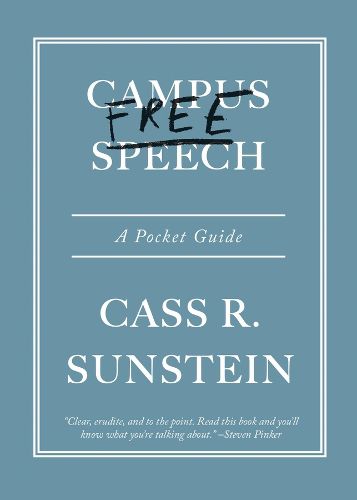Readings Newsletter
Become a Readings Member to make your shopping experience even easier.
Sign in or sign up for free!
You’re not far away from qualifying for FREE standard shipping within Australia
You’ve qualified for FREE standard shipping within Australia
The cart is loading…






A Forbes Best Higher Education Book of the Year
From renowned legal scholar Cass R. Sunstein, a concise, case-by-case guide to resolving free-speech dilemmas at colleges and universities.
Free speech is indispensable on college campuses: allowing varied views and frank exchanges of opinion is a core component of the educational enterprise and the pursuit of truth. But free speech does not mean a free-for-all. The First Amendment prohibits "abridging the freedom of speech," yet laws against perjury or bribery, for example, are still constitutional. In the same way, valuing freedom of speech does not stop a university from regulating speech when doing so is necessary for its educational mission. So where is the dividing line? How can we distinguish reasonable restrictions from impermissible infringement?
In this pragmatic, no-nonsense explainer, Cass Sunstein takes us through a wide range of scenarios involving students, professors, and administrators. He discusses why it's consistent with the First Amendment to punish students who shout down a speaker, but not those who chant offensive slogans; why a professor cannot be fired for writing a politically charged op-ed, yet a university might legitimately consider an applicant's political views when deciding whether to hire her. He explains why private universities are not legally bound by the First Amendment yet should, in most cases, look to follow it. And he addresses the thorny question of whether a university should officially take sides on public issues or deliberately keep the institution outside the fray.
At a time when universities are assailed on free-speech grounds from both left and right, Campus Free Speech: A Pocket Guide is an indispensable resource for cutting through the noise and understanding the key issues animating the debates.
$9.00 standard shipping within Australia
FREE standard shipping within Australia for orders over $100.00
Express & International shipping calculated at checkout
A Forbes Best Higher Education Book of the Year
From renowned legal scholar Cass R. Sunstein, a concise, case-by-case guide to resolving free-speech dilemmas at colleges and universities.
Free speech is indispensable on college campuses: allowing varied views and frank exchanges of opinion is a core component of the educational enterprise and the pursuit of truth. But free speech does not mean a free-for-all. The First Amendment prohibits "abridging the freedom of speech," yet laws against perjury or bribery, for example, are still constitutional. In the same way, valuing freedom of speech does not stop a university from regulating speech when doing so is necessary for its educational mission. So where is the dividing line? How can we distinguish reasonable restrictions from impermissible infringement?
In this pragmatic, no-nonsense explainer, Cass Sunstein takes us through a wide range of scenarios involving students, professors, and administrators. He discusses why it's consistent with the First Amendment to punish students who shout down a speaker, but not those who chant offensive slogans; why a professor cannot be fired for writing a politically charged op-ed, yet a university might legitimately consider an applicant's political views when deciding whether to hire her. He explains why private universities are not legally bound by the First Amendment yet should, in most cases, look to follow it. And he addresses the thorny question of whether a university should officially take sides on public issues or deliberately keep the institution outside the fray.
At a time when universities are assailed on free-speech grounds from both left and right, Campus Free Speech: A Pocket Guide is an indispensable resource for cutting through the noise and understanding the key issues animating the debates.